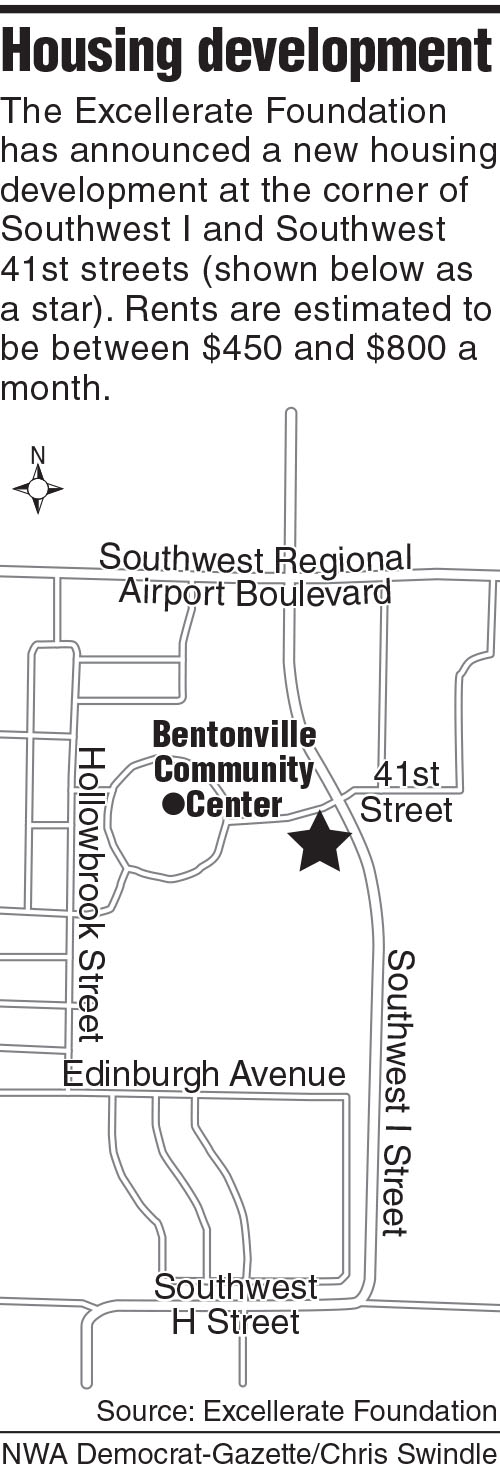BENTONVILLE -- About 200 housing units with rents estimated to be between $450 to $800 a month, depending on the size of the unit, will open in Bentonville by late 2025, according to a plan announced Thursday.
The units will go to families making between 30% and 60% of Northwest Arkansas' median household income, Excellerate Housing LLC said in a statement Thursday. This is to qualify for the federal Low Income Housing Tax Credit program.
Excellerate, Mercy Health Northwest Arkansas and developer Strategic Realty put the plan together.
Mercy Health sold Excellerate the approximately 10 acres located at the southwest corner of Southwest I and Southwest 41st streets for $1.3 million, far below its market value, said Jeff Webster, Excellerate president.
Excellerate Housing is a wholly owned subsidiary of Excellerate Foundation, a Springdale-based nonprofit organization that seeks to bring down housing costs. Excellerate Housing will in turn provide this land for the project, and Strategic Realty of Van Buren will develop it. The project is named McAuley Place in honor of Catherine McAuley, founder of the Sisters of Mercy, a religious order based in St. Louis and a major health care provider in Northwest Arkansas.
"The location is crazy great," Webster said in an interview Thursday. Schools, grocery stores and a Mercy medical clinic are all within walking distance, he said, along with a walking trail along the site's border and the Bentonville Community Center across the street.
City and regional groups have declared the high and rising cost of housing the greatest threat to Northwest Arkansas' continued growth. Bentonville in particular formed a housing authority work group of local builders, city government officials and other experts to study the problem. The group finished its study in January. The study found most Bentonville residents would have a hard time paying for a place to live if they were moving there today.
The Bentonville School District, for instance, is cooperating with Excellerate on another housing development so teachers and workers for the district can find an affordable place to live.
"The data shows the cost of housing in Bentonville has increased 98% in the last five years, " said Duke McLarty, executive director of Groundwork, the workforce housing branch of the Northwest Arkansas Council. The council is a group of business and community leaders working on regional problems.
The 30% to 60% income guideline amounts to $28,000 to $55,000 a year for a family of four, Excellerate's statement says. Housing prices in Bentonville drive many who work in Bentonville out of the city to find a place to live, according to Webster and Jim Petty, president of Strategic Realty.
Dr. Scott Cooper, regional physician executive for Mercy Health Northwest Arkansas, said in a statement that Sister Lisa Atkins was the main driver for this project and the one who suggested the name McAuley Place. Atkins is a member of the Sisters of Mercy, a nurse practitioner at Mercy Northwest Arkansas and a longtime advocate for addressing housing problems in the region.
In its first phase, McAuley Place will provide approximately 60 rental units with either one, two, or three bedrooms. Rents are projected to be between $450 and $800 per month, which will be largely protected for the next 35 years by federal and state guidelines. Excellerate estimates Bentonville residents will see $21 million in savings on their rent over the 35-year life of the project. The number will go up as the subsequent phases are completed.
The low-income housing tax credit allows investors, who put money into lower-income housing that meets the criteria, to take a credit on their taxes equal to the amount invested. The credit allows investors to make a profit while renting at below-market rates. Since investors make their contributions up front, developers canbuild the housing without going to a lender and borrowing heavily, which reduces their risks and costs.
"Too many hardworking people in Bentonville have to spend greater than 30% of their household income on rent," said Petty in a statement. Any household paying more than 30% of its income for housing rent meets the definition of "rent burdened" under federal guidelines.
"The number of rent burdened households in Bentonville has doubled in the past decade, with more and more of them having to choose between paying rent or paying for food or transportation or medical bills," Petty said. "That's a choice no family should have to make."
Council's decision on impact fees
The problem of high housing costs in Bentonville is so severe and well known, particularly in light of the city's own housing study, Webster said he was surprised and disappointed by the City Council's 5-3 decision Tuesday against bearing the cost of the city's impact fees for the project.
The impact fees charged by the city will cost about $179,000. The city's code specifically allows the council to pay impact fees on behalf of fee payers to promote economic development and provide affordable housing, according to council documents.
"Nowhere is the affordable housing crisis more prevalent in the region than in Bentonville," Webster said. "The people who are the core of Bentonville -- the public servants, the retail workers, the restaurant staff, paramedical professionals, and more -- can't afford to live in the city that they serve."
"The city's own [human resources] director was at the council meeting and told them the city has trouble hiring because people can't afford to live there," Webster said. Qualifying for the tax credit puts a strict cap on the amount the development can charge for rent so the project will have to bear the whole cost of the impact fees, he said.
Council Member Octavio Sanchez, who voted against paying the impact fees, said those fees pay for the inspections and other checks required to verify the project meets city codes. The city needs to recover those costs and "promote the welfare of all its residents," he said.
Council member Bill Burckart voted for the city to pay the fees and was a member of the Bentonville city work group on the housing cost crisis.
"There couldn't be a better case for this," he said of the chance for the city to pay the fees for McAuley Place. It is exactly the kind of project the work group hoped for when it specifically recommended the city pay those fees for affordable housing projects.
"It was quite surprising and disappointing," Burckart said. "It was our first opportunity to do this and we didn't do it."
On the web
Excellerate Foundation homepage:
https://www.excelleratefoundation.com


